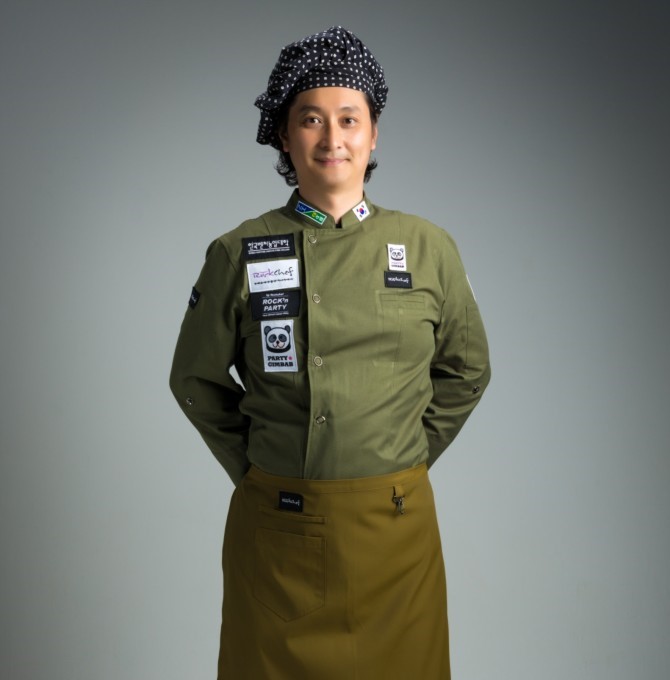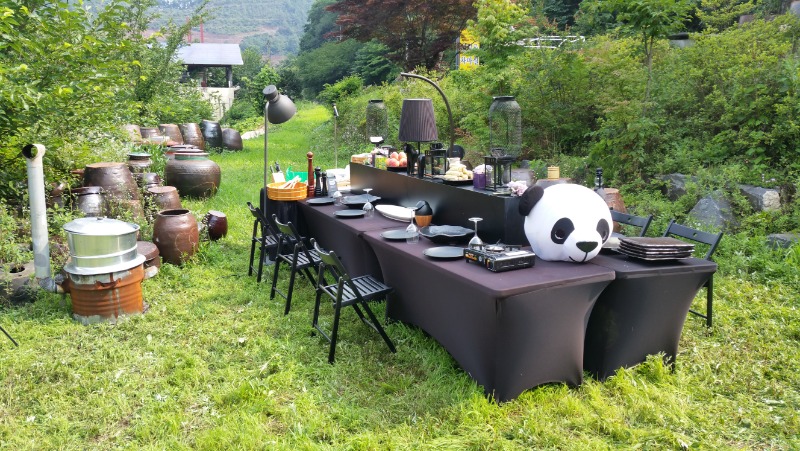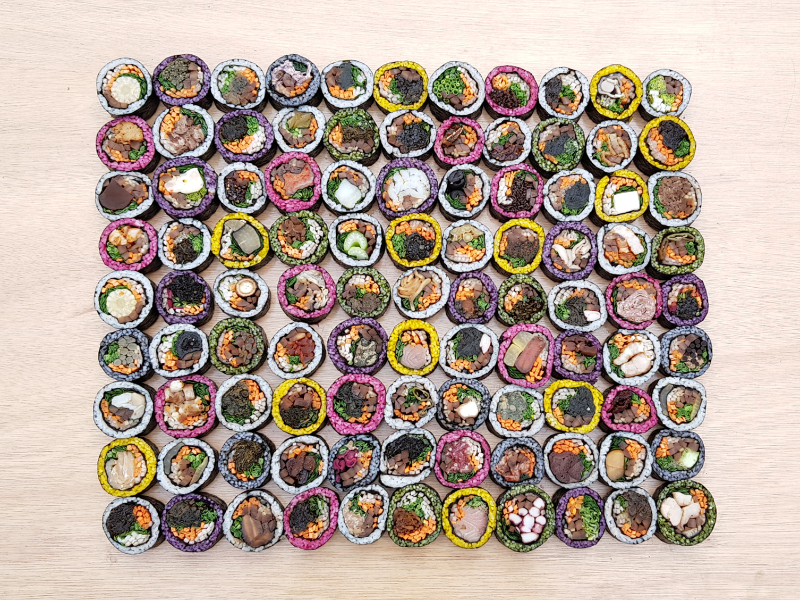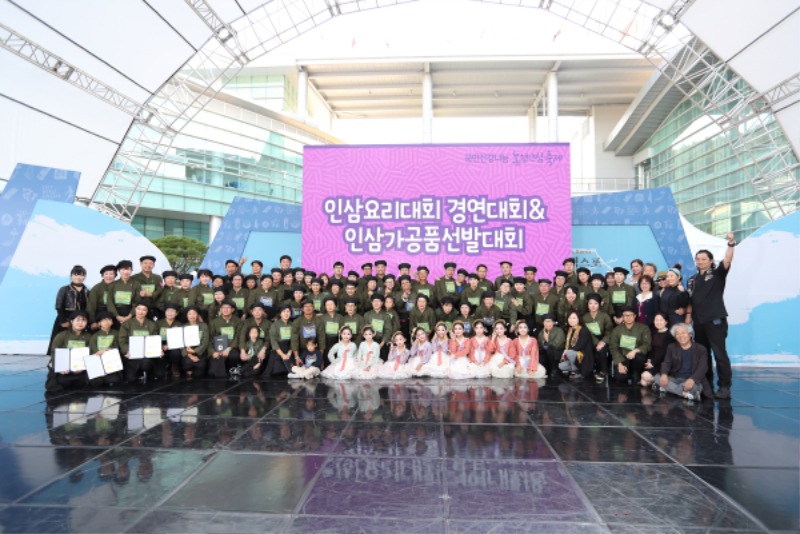 [Interview]Chef Kim Rockhun’s Gimbap:
[Interview]Chef Kim Rockhun’s Gimbap:
Protecting Flavor, Farmers, and the
Environment
Chef Kim Rockhun, also known as Rockchef
1. Please introduce yourself.
My name is Kim Rockhun, also known as Rockchef. I am the world’s first
“gimbap chef” and “farm party chef,” as well as the CEO of a social
enterprise that explores the abundant yet precious agricultural,
livestock, and fishery resources around us to make dishes that not
only spotlight Korean cuisine but also help create a global food
culture.
2. You have introduced yourself as a “gimbap chef” and “farm party
chef.” Would you elaborate on these titles? What is a farm party?
I personally designed Rockchef’s Farm Party to help people enjoy
parties in an organic way. This means minimally cooking fish, produce,
and processed products, and not using meat in order to reduce carbon
emissions. Rockchef’s Farm Party aims to bring total localism (a more
inclusive term for “local” than “glocal,” which suggests anticipation
for the development of an exclusive, local, food-based eating culture
as well as the expansion of local food’s role) to the dinner table by
adopting geographical indications (statements of product origin and
quality) and encouraging people to enjoy healthy and fun “farm
parties,” even in urban areas. Rockchef’s Gimbap is a new food-based
marketing platform. Using local produce data we gather through the
farm parties, we visit farming families and develop personalized
gimbap recipes for them. The One Recipe for One Farming Family
campaign is conducted free of charge to help support farming
households.

A farm party table setting

Paldo (eight-province) gimbap
3. At university, you majored in electronic engineering. How did you
become interested in cooking?
In 1997, when I was in my final year as an electronic engineering
major, prospects seemed to be good for students like me as the
semiconductor industry was booming. We thought we would be able to
easily join large corporations like Samsung, Hyundai Hynix, and LG and
earn high salaries. However, I was not really interested in finding a
job; instead, I dreamed of traveling the world, seeing New York,
London, Sydney, Madrid, and Tokyo from the lobbies of hotels and big
buildings. I began a personal world tour in search of new
opportunities. Traveling with a tight budget and without a plan, I
soon found myself in need of a job. In London, I struggled before
finding a position at a Japanese restaurant in Central London. There,
I encountered the profession of chef and began my relationship with
cooking.
4. You have worked hard to globalize hansik (Korean cuisine),
especially gimbap. Why do you love and pay such keen attention to
gimbap?
When I was working at the Japanese restaurant in London, Japanese food
was already considered gourmet. However, the Korean restaurants in
London were shabby, to say the least; few people knew about Korea, let
alone Korean food. This came as quite a shock to me and I was even
more stunned when I heard Japanese chefs say that futomaki was a kind
of sushi, not gimbap. This was like calling gimbap Japanese food. I
also saw that sushi restaurants held prized spots in downtown London.
Sushi was a wildly successful Japanese dish, one that Japanese people
took great pride in. Witnessing this, I made up my mind to return to
Korea and do my best to raise gimbap to the global spotlight,
alongside sushi. This resolution was the start of my infinite interest
in and love of gimbap.
5. Would you share more of your thoughts about gimbap?
I think gimbap is a perfect frame and platform through which we can
embrace ingredients and culinary cultures from all countries and
regions. I wanted to use gimbap to embody various characters, the
lives of farmers in different regions, and agri-food culture, a unique
and trendy convergence of culinary worlds. I didn’t want to stop
there, either—I also dreamed of an educational system that excels that
of sushi and grants certificates of expertise to all people that learn
how to make gimbap. I wanted gimbap experts and their creations to
become national representatives, share Korea’s agri-food culture with
the world, and prove gimbap’s ability to embrace global ingredients.
Gimbap is a “hot” item that is not just for Koreans but can harmonize
with any food culture of the world, and I wanted to show this to
everyone. This year, my dreams seem to be slowly coming true.

Chef Kim Rockhun, far right, and participants at a Korean cooking
competition focused on farmers and farm produce.
6. You are well-known for your paldo (eight-province) gimbap, which
combines local specialties from across Korea. You are also active in
the research, development, and nationwide distribution of gimbap
recipes. Please speak about gimbap’s potential for globalization.
I have made jamón gimbap in Spain, foie gras gimbap in France,
schweinshaxe gimbap in Germany, fish and chips gimbap in London,
stinky tofu gimbap in China, and steak gimbap in the United States. In
Japan, I combined gimbap with sushi. In addition to the original
gimbap with Korean ingredients, I have created many variations by
using popular items from different countries. People around the world
like gimbap because it is a “one-bite” dish. While there are always
things to consider, such as what new ingredients to choose and how to
upgrade gimbap’s value by incorporating different culinary cultures
and stories, there is no question about its marketability and global
appeal.
7. We sincerely hope that your love of gimbap will contribute to the
globalization of hansik and the promotion of Korean farmers. Last
but not least, what are your future plans and dreams?
I plan to start Paldo Kimbop, a gimbap franchise, and Rockchef, a
commercial platform for a brand of gim, the dried seaweed used in
making gimbap, making use of my marketing activities over the past 10
years. To that end, I will organize a global marketing group named
ROCKYSM with experts from various fields, including a global sports
management expert behind the success of a global football star and
similar specialists in packaging design and marketing, K-drama and
media content production, industrial design, factory automation,
K-pop, and real estate development focused on tourist farms.
To
realize smart solutions for a sustainable environment and future, I
will also work with regional governments to establish smart farms,
following the boom of agro-fishery products that has come with the
fourth industrial revolution, and seek ways of combining them with
gimbap, the perfect food item for the current era. In order to
financially support farming families as well as globalize hansik, I
will promote gimbap, farm cooking, and farm parties around the globe,
speaking to global citizens about why good ingredients need to exist.
△ Chef Kim Rockhun
ROCKCHEF
ROCKHUN, KIM / CEO
Current member of the Ministry of Agriculture, Food and Rural Affairs’
6th Industry Convergence Committee 現 농림축산식품부
6차산업융복합전문위원 6차산업융복합전문위원
Former representative of the Korean Food Publicity Hall at Cheongwadae
Sarangchae
Former publicity ambassador for the National Agricultural Cooperative
Federation
Celebrity-invited chef to an Emmy Awards after-party in the US
前 미국에이미시상식 에프터 파티 셀러브리티초청셰프
Presented a global gimbap publicity tour for the PyeongChang Winter
Olympics
Korean ambassador for the promotion of gimbap 대한민국김밥홍보대사
Ambassador for the promotion of Goheung, Jeollanam-do 전라남도
고흥홍보대사
President of the World Gimbap Association 세계김밥협회 회장
President of the World Gimbap Forum 세계김밥포럼 회장
 KOREA FOUNDATION
KOREA FOUNDATION newsletter
newsletter










